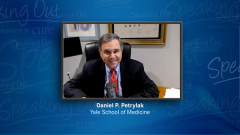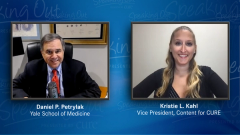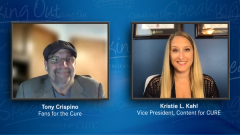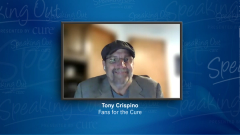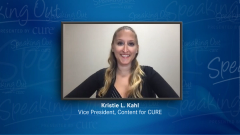
Although Patients With Prostate Cancer Have Differing Support Group Needs, Advocoate Says ‘Don’t Stop Looking’
As part of its Speaking Out video series, on behalf of Fans for the Cure, CURE® spoke with Tony Crispino about seeking support after a prostate cancer diagnosis.
Episodes in this series

Kristie L. Kahl: What are some areas outside of treatment, like the psychosocial effects from prostate cancer, that can occur?
Tony Crispino: Well, that's a mixed bag of tricks. A patient can be diagnosed early and a patient can be diagnosed late. And there's a myriad of emotions ranging from fear and anxiety to depression. So it's a full myriad. And it's very difficult to pick up where a patient was in their life when they start their diagnosis to begin with. So it's very important to try to understand the patient's mental state during a diagnosis. And it's very important for the patient himself to understand their mental state through their journey with prostate cancer.
Kahl: With that, why is it important for patients and their loved ones to seek support after a diagnosis?
Crispino: Many prostate cancer patients feel like they understand a lot of things without support from other things. It's not uncommon for us guys to not ask for directions when we're going someplace. But this is kind of the same story when it comes to prostate cancer, you get a diagnosis of prostate cancer. And for cases like myself, I didn't even know what prostate cancer was when I was diagnosed, and many men are in the same position to not understand. Caregivers are not any different. Caregivers have the same type of situations where they don't understand the disease either. And the key to quality of life with prostate cancer has a lot to deal with understanding and dealing with your own psychosocial issues, and your caregiver’s psychosocial issues as well.
Kahl: What are some examples of support groups that are available? And how can people find them?
Crispino: This is an evolving deal here, because there are many different types of support groups. And it's a good thing there is because most men diagnosed with prostate cancer have something to say. And if you're in very, very large groups, or what we would call the largest of the groups, you don't necessarily get a word to say (because) you're listening to others, and that doesn't fulfill your need for support. So I think that it's important that when you're looking for a support group that you understand that there's different support groups, there's different drivers in the support groups. One support group might not be good enough for you and might not meet your needs. And there's a reason to keep looking for a support group that does fit your needs, because it doesn't lessen the need for support groups. If the group you're in is an advanced prostate cancer support group and you're newly setting out on your journey, you're not going to get the information that you need to be able to be successful in dealing with your own quality of life.
So it's very important for a patient to understand there are many different support groups out there. You can find them online; most men find them online. Unfortunately, COVID has taken away the live support groups largely from us. And so therefore I find some very good groups on Facebook, I have found very good groups in looking at prostate cancer support through many means. Zero, Fans For The Cure, Us Too, all of these are different groups, all that have different areas of need for us. And it's important as a patient to understand we have a little bit to go through to find the group that best fits us, but don't stop looking.
Kahl: Can you discuss some of the resources that are available at Fans For The Cure?
Crispino: Fans For The Cure, like many other prostate groups, have changed through the years. I first met one of the founders, Ed Randall, back in 2008 and the needs of a prostate cancer patient in 2008 (were different). (Prostate cancer back then was) going to probably be treated (regardless), whereas today 50% of prostate cancer diagnoses are never going to see a treatment for the disease. It's important to know these nuances and understand the development's as they've changed.
Ed Randall had developed Fans For The Cure, originally it was Bat For The Cure, but it did a wonderful job of getting men to understand their need, to know if they've got prostate cancer, what the resources are around them, and then provide support groups, which can help men navigate the journey of prostate cancer. I think Fans For The Cure is right up with the leading groups of being able to bring all the different nuances together, so that a patient who's advanced can find a peer. And a patient who's newly diagnosed can find a peer. I think that those are the nuances that are what you'll find and Fans For The Cure can bring them all together in one side.
Kahl: What would you say is your biggest piece of advice for a patient who's thinking about seeking support?
Crispino: Know your limitations. The biggest thing that I find with prostate cancer patients is (they are) uneducated when they first come in, and then I talked to a 10-year veteran, and I would have a totally different conversation with a 10-year veteran than with a newly diagnosed (patient). So the key to success and quality of life. And navigating prostate cancer is education. And I always say the same thing to all the patients: Educated decisions are always better than emotional decisions. And it's very important for patients to go through and navigate their weaknesses and work with educating themselves so they're no longer weaknesses.
Transcription edited for clarity and conciseness.

